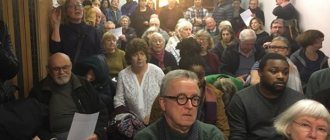By a simple majority of votes from the owners participating in the meeting - everything else, for example:
| subject | question |
| Issues related to common property | ✓ on the improvement of the land plot on which the house is located and which belongs to the common property, including the placement, maintenance and operation of landscaping and landscaping elements on such a site (clause 2.1, part 2, article 44 + part 1, art. 46 of the Housing Code of the Russian Federation), ✓ on current repairs of common property in the house (clause 4.1, part 2, article 44 + part 1, article 46 of the Housing Code of the Russian Federation), ✓ on identifying a person authorized on behalf of the owners to submit an application for state cadastral registration and (or) state registration of rights to real estate objects that are part of the common property by force of law, applications for state cadastral registration of an apartment building in connection with a change in its characteristics as a result of reconstruction or during redevelopment of the premises located in it (clause 3.6, part 2 Article 44 + Part 1 of Article 46 of the Housing Code of the Russian Federation). |
| Issues related to the choice and implementation of a control method | ✓ selection of a management method for apartment buildings (part 3 of article 161, clause 4 of part 2 of article 44 + part 1 of article 46 of the Housing Code of the Russian Federation), ✓ choice of a management organization (part 8.2 of article 162 + part 1 of art. 46 of the Housing Code of the Russian Federation), ✓ approval of the terms of the management agreement for an apartment building (Part 1 of Article 162 + Part 1 of Article 46 of the Housing Code of the Russian Federation). In this case, the agreement itself must be signed by the owners who have at least 50% of the votes of the total number of votes of the owners. In connection with the requirement of the Housing Code of the Russian Federation for the owners to sign the agreement with 50% of the votes, there is a point of view that a decision on such an issue should also be made not by a simple majority of those participating, but by more than half the votes throughout the entire house. ✓ refusal to execute the management agreement unilaterally (part 8.2 of article 162 + part 1 of article 46 of the Housing Code of the Russian Federation), ✓ on the reorganization of the HOA by converting it into a housing cooperative or housing cooperative (part 2 of article 140 + part 1 of art. 46 of the Housing Code of the Russian Federation), ✓ on the liquidation of the HOA if its members do not have more than 50% of the votes of all owners (Part 2, Article 141 + Part 1, Article 46 of the Housing Code of the Russian Federation). |
| Questions about the MKD council | ✓ selection and re-election of the MKD council and its chairman, election of owner commissions (Parts 1, 6, 12 of Article 161 + Part 1 of Article 46 of the Housing Code of the Russian Federation), ✓ on establishing remuneration for members of the MKD Council, including the chairman (Part. 8.1 Article 161 + Part 1 Article 46 of the Housing Code of the Russian Federation) ✓ on the term of office of the MKD council (by default – 2 years) (Part 10 of Article 161 + Part 1 of Article 46 of the Housing Code of the Russian Federation), ✓ on the use of the information system in the activities of the council of MKD and its chairman, commissions of owners in the event of their election, as well as on the determination of persons who, on behalf of the owners, are authorized to ensure the activities of the council, chairman, commissions (part 13 of article 161 + part 1 of article 46 of the Housing Code of the Russian Federation ). |
| Issues regarding holding general meetings | ✓ on financing expenses associated with convening and organizing a meeting by the management organization, the board of the HOA or cooperative in accordance with Part 6 of Art. 45 of the Housing Code (clause 3.5, part 2, article 44 + part 1, article 46 of the Housing Code of the Russian Federation), ✓ on the method of sending to the owners a message about holding a general meeting or on a location accessible to all owners for posting such messages (part 4, art. 45 + part 1 of article 46 of the RF Housing Code), ✓ on the timing of the annual general meeting (part 1 of article 45 + part 1 of article 46 of the RF LC), ✓ on the place (address) of storing copies of minutes of meetings and decisions of owners (Part 4 of Article 46 + Part 1 of Article 46 of the Housing Code of the Russian Federation), ✓ on the premises accessible to all owners, in which the initiator posts the results of the meeting (Part 1 and Part 3 of Article 46 of the Housing Code of the Russian Federation), ✓ on using the information system when holding a general meeting of owners in the form of absentee voting (clause 3.2, part 2, article 44 + part 1, article 46 of the Housing Code of the Russian Federation), ✓ making decisions on identifying persons who, on behalf of the owners of premises in an apartment building, are authorized to use of the system or other information systems when holding a general meeting of owners of premises in an apartment building in the form of absentee voting (hereinafter referred to as the administrator of the general meeting) (clause. 3.3 hours 2 tbsp. 44 + part 1 tbsp. 46 of the Housing Code of the Russian Federation), ✓ deciding on the procedure for the administrator of the general meeting to receive messages about holding general meetings of owners of premises in an apartment building, decisions of owners of premises in an apartment building on issues put to vote, as well as on the duration of voting on issues on the agenda of the general meeting of owners premises in an apartment building in the form of absentee voting using the system (clause 3.4, part 2, article 44 + part 1, article 46 of the Housing Code of the Russian Federation) |
| On the transition to direct contracts | ✓ on the conclusion by owners, acting on their own behalf, of agreements containing provisions for the provision of utility services, an agreement for the provision of services for the management of MSW with resource supply organizations and the regional operator for the management of MSW (Clause 4.4, Part 2, Article 44 + Part. 1, Article 46 of the Housing Code of the Russian Federation), ✓ on the date of concluding agreements containing provisions on the provision of utility services, contracts for the provision of services for the management of MSW with resource supply organizations and the regional operator for the management of MSW (Clause 1, Part 7, Article 157.2 + Part 1 of Article 46 of the Housing Code of the Russian Federation). |
| About payment | ✓ on determining the amount of expenses for payment of utility resources consumed during the use and maintenance of common property based on the average monthly volume of their consumption, with recalculation based on the indications of the ODPU or based on the volume of consumption determined by the ODPU (Part 9. Article 156 + Part. 1, Article 46 of the Housing Code of the Russian Federation). |
| Resolving issues related to direct house management | ✓ on the conclusion of contracts for the provision of services (performance of work) for the maintenance and repair of common property in a house with direct management (part 1 of article 164 + part 1 of article 46 of the Housing Code of the Russian Federation), ✓ on a person authorized to act in relations with third parties on behalf of the owners in a house with direct management (part 3 of article 164 + part 1 of article 46 of the Housing Code of the Russian Federation) |
| All other issues within the competence of the general meeting of owners (clause 5, part 2, article 44 of the Housing Code), for example: | ✓ on refusal to indicate barcodes in the payment document when managing a house of an HOA or cooperative (subclause k(1) clause 69 of the Rules for the provision of public utilities No. 354 + part 1 of article 46 of the Housing Code of the Russian Federation), ✓ on addition to the list of “other documents” related to management, not specified in clause 26 of the Rules for the maintenance of common property No. 491 (subparagraph “e” of clause 26 of the Rules for the maintenance of common property No. 491+ part 1 of article 46 of the Housing Code of the Russian Federation) ✓ on the conclusion of an energy service agreement (contract) (clause 38(2) of the Rules for the maintenance of common property No. 491 + part 1 of article 46 of the Housing Code of the Russian Federation). |
Some wording in the law is not directly indicated, so the initiator has questions about where to include them, because the number of votes will depend on this: Is the barrier an improvement or about the limits of use of the land? Is a partition in common areas just a redevelopment or a reduction in common property? Is sealing a garbage chute some kind of reconstruction or reduction of common property, or is it simply a choice of waste collection method? Is installing video surveillance the use of common property, refurbishment or none of the above?
Initiators should focus on local judicial practice, or they can ask the housing inspector in advance.
What issues are resolved at the general meeting?
The general meeting of residents with voting rights decides:
- Who will manage the house? A board of residents, an HOA or a housing cooperative can be created in the building. It can be managed by a company authorized to do so - MA.
- When, by whom and with what funds to carry out reconstruction, repairs and other construction work in the house. So, at a general meeting they decide when to repair the roof, where to buy materials to restore the facade, and how the children's playground will be designed.
- How it can be used. The land around the house can be given over to plant flower beds or used to create a parking lot.
- Under what conditions will common property be transferred to third parties? Together they select a tenant, set the amount of rent, and determine where to send the proceeds.
The agenda is discussed jointly. Decisions are made after counting the votes of all those eligible to vote. The adopted decision obliges each homeowner to follow it, regardless of the degree of his participation in the meeting.
So, if someone does not agree that the place of the flowerbed under his window will be taken by a neighbor’s car, but this state of affairs satisfies the interests of the majority of citizens living in the house, then he will have to come to terms with it.
To make some decisions, you must receive at least 2/3 of the votes. In this case, the votes of all residents are taken into account, and not just those who attended the next meeting.
How to vote?
Voting can be carried out in the usual way (raise of hands, expression of one's will on paper and transmission to the chairman) or electronically. It all depends on the form of the meeting.
Usually, all residents are sent a form with questions (those present at the meeting vote by show of hands, the chairperson or secretary counts the votes for and against).
The document handed to the owner is marked with a date by which he must make a decision. This type of voting is used in absentee and in-person forms of collection.
If voting is carried out remotely, electronically or in writing, the chairman of the meeting or HOA appoints a responsible person (administrator).
He notifies interested parties of the meeting and is responsible for ensuring that they receive the question paper in a timely manner. Decisions are made within 3 to 5 days.
What issues can be put to a vote by the owners of an apartment building?
Issues related to:
- restoration work;
- construction of premises for household needs;
- allocation of money for repairs;
- the formation of a monetary fund for repairs and other needs;
- the amount of contributions for repairs;
- obtaining a loan;
- ways of using the land adjacent to the house;
- determination of persons who can act on behalf of everyone in matters of managing the affairs of the house;
- a way to notify about future meetings;
- choosing a voting form;
- home management.
At the meeting, the procedure for financing the OSS is established.
Do I need to keep minutes of the meeting?
The OSS protocol is an official legal document, therefore it is mandatory to maintain it. A secretary elected by the meeting is appointed responsible for it.
Documents and ballots with voting results are attached to the protocol. The secretary is given no more than 10 days to complete the protocol in person.
In another form of collection, the document is drawn up after receiving responses from the owners. Quite stringent requirements are placed on him. Its content must comply with the plan developed by Order of the Ministry of Construction No. 937. The standard protocol includes:
- header (title, by whom, date, place, content);
- the main part (information about the initiator, owners and invited persons indicating passport details, agenda);
- information about the place where the document is to be stored;
- application;
- signatures.
Example of a header. Protocol OSS MKD No. 12, led by Secretary Ivashkevich. R. I, passing at the address (specify), January 22, 2019, contains.
The main part also indicates whether a quorum has been reached. In the absence of some owners, the quorum will be considered the percentage of those present, correlated with those who did not come.
The protocol is conducted from a third party, using wording such as:
- decided;
- decided;
- considered.
Example: OSS of the house (number) decided to store basic documentation at the address (indicated) for (month, year).
The absence of a quorum, and therefore the absence of decisions that could be taken by them, also constitutes a mistake. The agenda cannot be changed. But you can make additions, which are subsequently recorded by the secretary in the protocol.
Who finances the OSS MKD?
Issues of financing the OSS are explained in the Letter of the Ministry of Construction of the Russian Federation dated N 27535-OL/04 dated February 28, 2015. The document states that financial issues are dealt with by the persons who convened the meeting. It can be:
- home owners;
- UO.
The only correct opinion on this issue has not been formed, therefore it is better to determine the procedure for the receipt of financial resources in advance by concluding a management agreement, raising the relevant issue for consideration at the next meeting.
Deciding who will pay for convening people is extremely important. If the house is small, then the costs will be small, but to convene residents in apartment buildings with 100-200 or more apartments, significant financial support will be required due to the need to pay for sending registered letters, purchasing forms and other costs.





